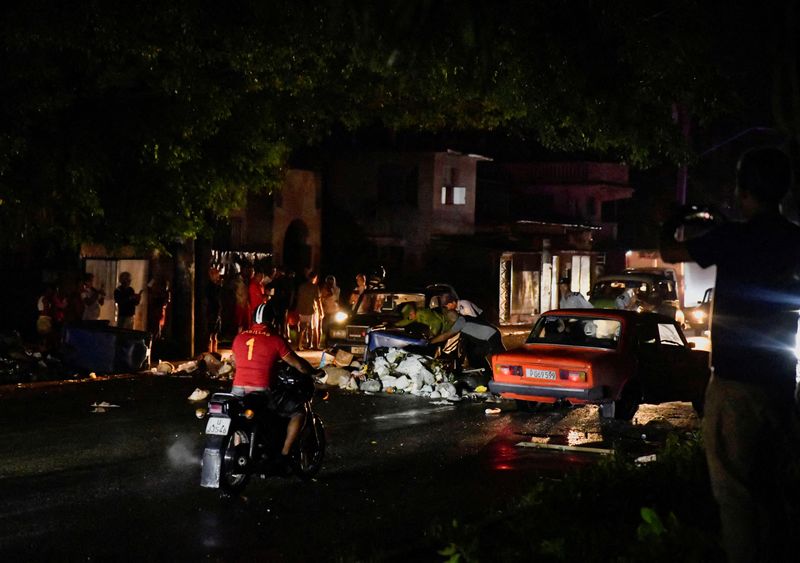In Havana's still dark corners, a protest erupts
By Dave Sherwood
HAVANA (Reuters) - Just three or four city blocks in all of Central Havana remained without electricity on Monday evening - an island of darkness in the Cuban capital's sea of flashing lights, pounding reggaeton and jammed bars and cafes.
That is where an unusual protest broke out.
Near the intersection of Campanario and Salud streets, dozens of residents chanted "We want light!" while banging pots with metal spoons. They were angry, they said, after four days without electricity in their homes following a near-unprecedented collapse of Cuba's grid on Friday.
Cuba's grid operator restored power to Havana by nightfall on Monday, days after a grid failure cut power for the Caribbean country's 10 million people.
Officials on Tuesday said around 90% of Havana - a city of around 2 million people - had seen light return by midday. The government has warned that despite progress, blackouts will continue.
Cuba's oil-fired power plants, already obsolete and struggling to keep the lights on, reached a full crisis this year as oil imports from Venezuela, Russia and Mexico dwindled.
"We've gone four days without electricity. Our food is going bad. Our kids are suffering. We don't have ... water," said Marley Gonzalez, a resident who banged a pot in protest, surrounded by her neighbors.
Blackouts as long as 18 or 20 hours a day have become the norm in the past month across Cuba's outlying provinces, where tensions have flared amid an unprecedented economic crisis that has also made food, water, fuel and medicine scarce.
But the latest all-day blackouts in Havana, densely populated and long protected from the worst outages, marked a sudden change for the capital's residents.
Reuters spoke with seven people during and after the protest on Monday evening. Most described the prolonged blackouts as a last straw, another in a growing list of problems.
Housewife Ramona Martinez, 37, said she could not afford to feed her four children on the 2,600 peso monthly stipend ($8 based on Cuba's widely used unofficial rate) she received from the government. Prices have soared in Cuba over the past three years, while wages and benefits have barely budged.
"It's not even enough for a bag of (powdered) milk," said Martinez as her 6-year-old son, who has cerebral palsy, retched on the bed in her one-room home. "This is crazy."
Martinez's refrigerator, standing with its doors open, housed only a pill bottle of Vitamin C, a bag of thawed chicken and several empty plastic bottles.
"They haven't put on the electricity and they don't give us any response," she said. "So we took to the streets as a community."
The neighborhood around Campanario Street, where the protest took place, is stark. Heaps of trash line some intersections. Roads have deep potholes. Many families are crammed into small spaces in decrepit buildings whose facades and terraces are crumbling.
FAIR WARNING
During the protest, many residents, their patience worn thin, shouted in anger at their predicament.
"My 85-year-old grandmother has been asking me for cold water since Friday when we lost power" said Alcer Alfonso, a young man in a ragged white T-shirt, as he rallied the crowd to chant "light!"
Street protests in Communist-run Cuba are rare. On July 11, 2021, anti-government rallies rocked the island, the largest since former Cuban leader Fidel Castro's 1959 revolution. Those protests followed months of isolation during the pandemic, but also, growing anger over shortages and blackouts.
President Miguel Diaz-Canel spoke on national television on Sunday, just prior to the Central Havana protest, encouraging Cubans to air grievances with "discipline" and "civility."
"We are not going to accept nor allow anyone to act with vandalism and much less to alter the tranquility of our people," Diaz-Canel said. "That's a conviction, a principle of our revolution."
Police gathered on Monday at a nearby intersection in Central Havana, observing protesters from a distance but not confronting them.
Resident Leyke Milay Puentes, 42, sat on her doorstep a few paces from the protest, pointing up and down the road at others just a city block away walking lit streets.
"There's electricity over there and over there," she said, shaking her head. "Everywhere but here."
Source: Investing.com
